Select Language

(Reuters) - Companies in the United States and Canada have kicked off 2024 with thousands of job cuts across sectors, signaling that the spate of layoffs seen in 2023 could persist as they scramble to rein in costs.
While job cut announcements in the United States more than doubled month-on-month to 82,307 in January, they were down 20% from a year earlier, according to a report by outplacement firm Challenger, Gray & Christmas earlier in February.
The technology sector, which accounted for the highest number of layoffs in 2023, has seen 34,000 job cuts in 141 firms so far this year, according to tracking website Layoffs.fyi.
Here is a snapshot of job cuts announced so far in 2024:
TECHNOLOGY
* Amazon (NASDAQ:AMZN)'s job cuts include less than 5% of employees at Buy with Prime unit, 5% at audiobook and podcast division Audible, several hundred in streaming and studio operations, 35% at streaming unit Twitch and a few hundred at healthcare units One Medical and Amazon Pharmacy.
* Layoffs at Alphabet (NASDAQ:GOOGL) include dozens at division for developing new technology X Lab, hundreds in advertising sales team, hundreds across teams, including hardware team responsible for Pixel, Nest and Fitbit (NYSE:FIT), and a majority in augmented reality team.
* Microsoft (NASDAQ:MSFT) is cutting around 1,900 jobs at gaming divisions Activision Blizzard (NASDAQ:ATVI) and Xbox.
* IBM (NYSE:IBM) plans to lay off some employees in 2024, but will hire more for AI-centered roles.
* E-commerce firm eBay (NASDAQ:EBAY) plans to cut about 1,000 roles, or around 9% of its workforce.
* Videogame software provider Unity Software to cut about 25% of workforce, or 1,800 jobs.
* DocuSign (NASDAQ:DOCU) plans to reduce workforce by about 6%, or 400 employees, with a majority in its sales and marketing organizations.
* Snap plans to cut around 528 jobs, or 10% of its global workforce.
* Salesforce (NYSE:CRM) is laying off about 700 employees, or roughly 1% of its global workforce.
* Network giant Cisco (NASDAQ:CSCO) is planning to restructure its business which will include laying off thousands of employees.
* Autonomous vehicle technology company Aurora Innovation lays off 3% of workforce.
* Canada's BlackBerry (NYSE:BB) plans more layoffs, in addition to about 200 job cuts in the prior quarter.
* Satellite radio company SiriusXM plans to reduce workforce by about 3%, or about 160 roles.
MEDIA
* Walt Disney (NYSE:DIS)'s Pixar Animation Studios is set to cut jobs as the studio has completed production on some shows.
* Comcast-owned British media group Sky plans to cut about 1,000 jobs across its businesses this year.
* The Los Angeles Times plans to lay off 94 journalists.
* Paramount Global is planning to conduct unspecified number of layoffs.
* Business Insider plans to lay off around 8% of its staff.
* Bell Canada plans to slash 4,800 jobs.
FINANCIAL SERVICES
* PayPal (NASDAQ:PYPL) Holdings is planning to cut about 2,500 jobs, or 9% of its global workforce this year.
* Payments firm Block Inc has started to cut unspecified jobs.
* Citigroup is planning to reduce its headcount by 20,000 people over the next two years.
* Investment banking giant Morgan Stanley is planning to cut hundreds of jobs in its wealth management unit, a person familiar with the matter told Reuters, adding that the cuts will impact less than 1% of the division's employees.
* Exchange operator Nasdaq plans to slash hundreds of jobs as it integrates fintech firm Adenza into its business.
* Asset manager BlackRock (NYSE:BLK) is set to cut about 3% of its workforce, but expects larger headcount by end-2024.
CONSUMER AND RETAIL
* Cosmetics giant Estee Lauder (NYSE:EL) plans to cut 3% to 5% of its global workforce.
* Wayfair (NYSE:W) plans to lay off 1,650 employees, or about 13% of its workforce.
* U.S. department store chain Macy's (NYSE:M) is cutting 2,350 jobs, closing five stores.
* Levi Strauss & Co (NYSE:LEVI) is planning to slash 10%-15% of global corporate jobs.
* Hershey's restructuring plan will impact less than 5% of its workforce.
* Nike (NYSE:NKE) will cut about 2% of its total workforce, or more than 1,600 jobs, as the sportswear giant looks to cut costs after flagging weaker profits this year.
HEALTH
* Novavax (NASDAQ:NVAX) is cutting about 12% of workforce.
MANUFACTURING
* Defense contractor Lockheed Martin (NYSE:LMT) is planning to cut 1% of its jobs.
* United Parcel Service (NYSE:UPS) plans to cut 12,000 jobs to cut costs.
NATURAL RESOURCES
* U.S. miner Piedmont Lithium cuts 27% of workforce in cost-cutting plan.

(Reuters) - The U.S. Federal Aviation Administration said on Thursday it was awarding $970 million to 114 airports across the country as part of efforts to refurbish and expand aging infrastructure.
The awards include $35 million to Washington Dulles International Airport to fund part of a 14-gate terminal building and $40 million to Chicago O'Hare funding improvements to one of its terminals, the FAA said in a statement.
The Biden administration awarded similar amounts to airports last year and in 2022, as the country spends tens of billions to renovate aging airports that were often mocked.
The FAA said the grants would help "meet the growing demand for air travel and launches projects that will improve passenger experience."
Among projects set to receive funds are Los Angeles International Airport, which will get $31 million for improvements of surrounding roadways, and San Francisco International Airport, receiving $31 million to replace mechanical and electrical components.
International airports in Salt Lake City, Denver and Charlotte will also get $20 million or more each, according to the FAA.
The investments "will make it easier for passengers to get to and through airports, create jobs, and increase safety for all," Transportation Secretary Pete Buttigieg said.
The vast majority of the terminal projects being awarded money are still under construction, the statement added.

WASHINGTON (Reuters) - Production at U.S. factories unexpectedly fell in January, weighed down by harsh winter weather.
Manufacturing output dropped 0.5% last month after an unrevised 0.1% gain the prior month, the Federal Reserve said on Thursday. The Fed attributed the decline to "winter weather."
Economists polled by Reuters had forecast factory output would be unchanged. Production at factories fell 0.9% on a year-on-year basis in January.
Manufacturing, which accounts for 10.3% of the economy, could be on the verge of recovery after treading water for much of 2023 following 525 basis points worth of interest rate hikes from the U.S. central bank since March 2022. A survey from the Institute for Supply Management early this month showed its manufacturing PMI contracting slightly in January.
Motor vehicle and parts output slipped 0.2% last month after increasing 3.2% in December. Durable goods manufacturing production edged up 0.1%. There were large increases in the production of electrical equipment, appliances and components as well as aerospace and miscellaneous transportation equipment.
Output of computer and electronic products also rose, lifted by semiconductor production. But output of nonmetallic mineral products and primary metals fell.
Production of nondurable goods dropped 1.1%. There were significant weather-related declines in the output of petroleum and coal, chemicals, plastics and rubber products.
Mining output fell 2.3% as harsh weather weighed on oil and gas extraction as well as coal production. Mining production increased 0.9% in December. Utilities production rebounded 6.0% as freezing temperatures boosted demand for heating. That followed a 1.7% drop in December.
Overall industrial production dipped 0.1% in January after being unchanged in December. Industrial production was unchanged year-on-year in January.
Capacity utilization for the industrial sector, a measure of how fully firms are using their resources, fell 0.2 percentage point last month to 78.5%. It is 1.1 percentage points below its 1972-2023 average. The operating rate for the manufacturing sector declined to 76.6% from 77.1% in December. It is 1.6 percentage points below its long-run average.
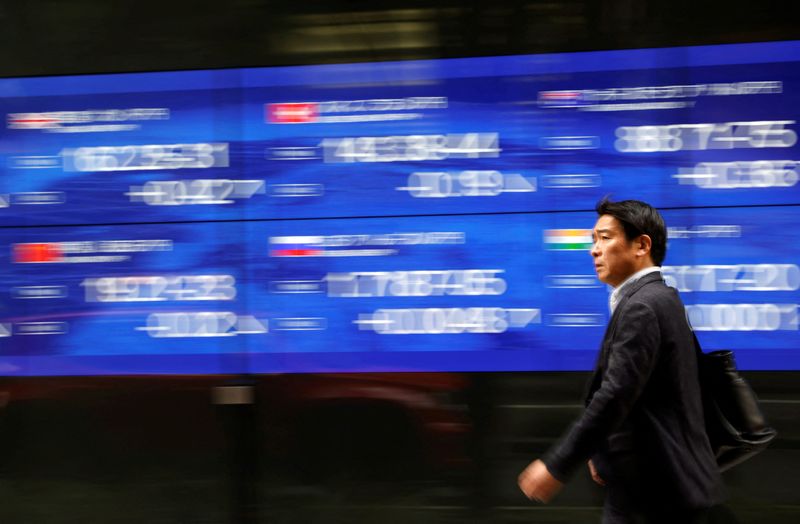
By Brigid Riley
TOKYO (Reuters) - Japan's benchmark Nikkei got off to a roaring start on Friday, opening the morning session at its highest since Japan's economic bubble burst in the late 1980s.
The Nikkei share average was last up 1.6% at 38,769.64, surpassing the post-economic bubble era high of 38188.74. So far it's up 14.0% for the year.
The broader Topix was up 1.1% at 2620.53.
The Nikkei was within touching distance of the all-time record high of 38,957.44 hit in December 1989.
The stock market was buoyed by a strong day on Wall Street overnight. U.S. stocks closed higher as retail sales data declined more than expected, feeding hopes the Federal Reserve will soon start cutting interest rates in coming months.
The largest percentage gainers in the index were Advantest Corp up 4.91%, followed by Tokyo Electron Ltd gaining 4.74% and Resonac Holdings Corp up by 4.32%.
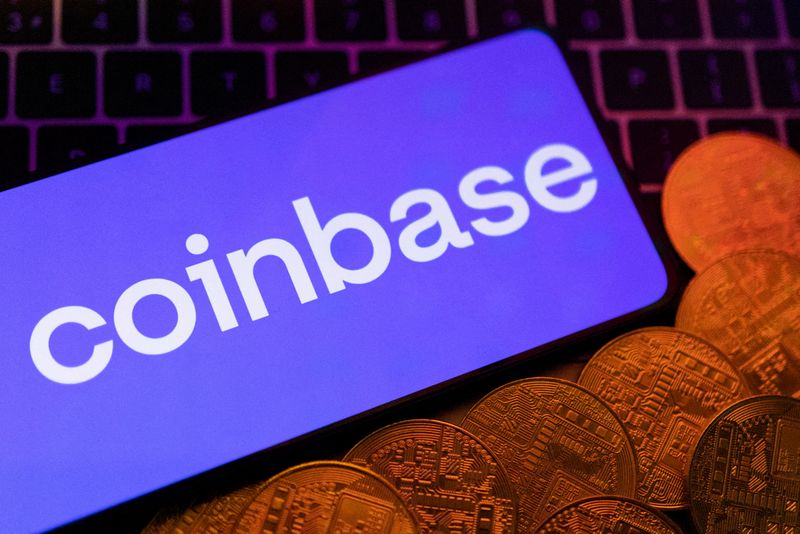
(Reuters) -Coinbase Global on Thursday posted its first quarterly profit since 2021 on sturdy trading volumes due to a resurgence of interest in crypto, sending its shares up nearly 12% after the bell.
Investor enthusiasm for crypto was rekindled in recent months by the U.S. Securities and Exchange Commission's (SEC) expected approval of the first spot bitcoin exchange-traded funds (ETFs).
While the ETFs were approved only in January, expectations of a favorable decision by the SEC propelled bitcoin's price 57% higher in the last three months of 2023.
That drove a 64% jump in crypto exchange Coinbase (NASDAQ:COIN)'s transaction revenue to $529.3 million in the fourth quarter, with both consumer and institutional investors contributing to the rally.
The crypto exchange now expects a strong first quarter for its subscription and services unit, which houses businesses other than trading.
It forecast revenue from the unit between $410 million and $480 million, higher than LSEG estimate of $356.22 million.
In the fourth quarter, revenue from the unit jumped nearly 33% to $375.4 million, with the biggest boost coming from stablecoin revenue - the interest that Coinbase earns from its partnership with fintech firm Circle.
Circle issues the USD Coin (USDC) stablecoin that it jointly governs with Coinbase. The interest on reserves backing USDC are a major source of revenue for Coinbase, which has been able to pocket higher income because of the Federal Reserve's interest rate hikes.
Overall, the company reported a profit of $273.4 million, or $1.04 per share, in the three months ended Dec. 31, compared with a loss of $557 million, or $2.46 per share, a year earlier. Analysts had expected a loss of 1 cent per share, according to LSEG data.

By Tim Hepher
PARIS (Reuters) -Europe's Airbus unveiled a special dividend on Thursday after posting higher 2023 results, buoyed by record airplane orders and higher deliveries but dampened by a fresh charge of 200 million euros ($214.62 million) in its troubled Space unit.
The world's largest commercial planemaker said core adjusted operating profit rose 4% to 5.8 billion euros as revenue rose 11% to 65.4 billion, and predicted core profit of 6.5 to 7.0 billion euros in 2024.
Airbus proposed an unchanged regular dividend of 1.8 euros a share, and added a special dividend of 1 euro per share as net cash topped the 10-billion-euro threshold previously identified as a potential trigger for returning cash to shareholders.
Airbus is riding a wave of orders from airlines coping with a rebound in travel demand from the pandemic, helping it to build up cash reserves in contrast with U.S. rival Boeing (NYSE:BA) which is mired in debts stemming from a series of crises.
Airbus, as expected, forecast around 800 jet deliveries for 2024 but announced a further delay in entry to service of its A321XLR single-aisle jet to the third quarter from the second. The first customer airplane entered final assembly in December.
The company's forecasts are subject to no further disruption to tight global supply chains or the world economy.
The Space unit charge brings the total written off in that segment last year to 600 million euros and comes a day after Reuters reported that CEO Guillaume Faury had told staff that large, unexpected charges in the business were "not acceptable".
Space Systems chief Jean-Marc Nasr is leaving his position from next month, with Faury telling him in a recent internal memo that "it is what it is," Reuters reported on Wednesday. Nasr could not be reached for comment.
The charges helped push divisional Defence and Space profits down 40% to 229 million euros while Helicopters rose 15%.
Airbus is among European companies facing fierce competition from U.S. launchers and a new generation of low-cost satellites.
Faury, however, told staff in a letter last month that Airbus is better off with a high-performing Defence and Space business than without a presence in those areas.
($1 = 0.9319 euros)
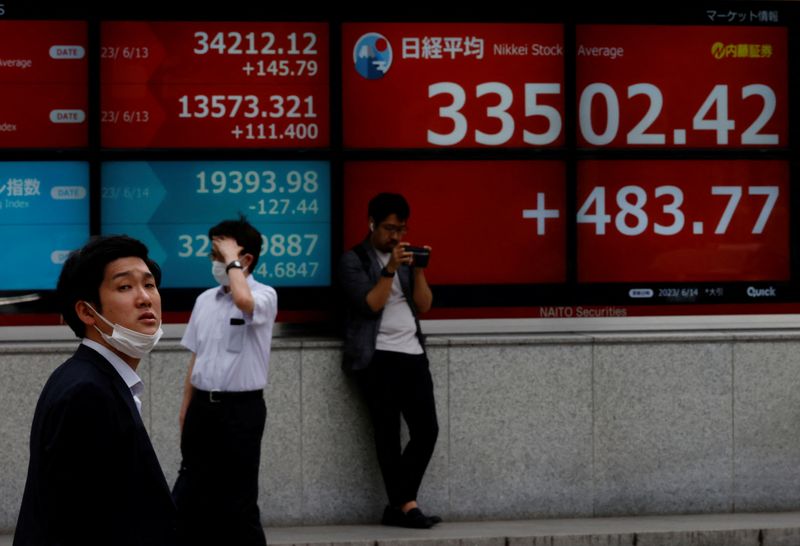
By Ankur Banerjee
SINGAPORE (Reuters) - Asian stocks rose on Thursday, with the Nikkei breaching a new 34-year peak, while the dollar took a breather near a three-month high as markets assess when the Federal Reserve is likely to start its easing cycle after a run of strong economic data.
MSCI's broadest index of Asia-Pacific shares outside Japan rose 0.7%, with the IT index surging more than 2%. Taiwan stocks spiked 2.6% higher, with chipmaker TSMC up nearly 8%.
Hong Kong's Hang Seng Index eased 0.67% in early trading. China's markets are closed for the week due to the Lunar New Year holidays.
On Wednesday, Wall Street ended sharply higher as ride-hailing platforms Lyft (NASDAQ:LYFT) and Uber (NYSE:UBER) rallied, while Nvidia (NASDAQ:NVDA) displaced Alphabet (NASDAQ:GOOGL) as the U.S. stock market's third-most valuable company. [.N]
Japan's Nikkei remains on the charge and rose in early trading to 38,127, its highest since January 1990 and was inching closer to surpass its record high.
The yen edged higher but traded near the psychologically important 150 per dollar level. The yen was last at 150.26 per dollar.
The 150 level on the pair has been seen in the past as a potential catalyst for intervention by Japanese monetary authorities. It was just past this level that led them to intervene to shore up the yen in late 2022.
Data on Thursday showed Japan's economy slipped into recession as it unexpectedly shrank for a second straight quarter on weak domestic demand, raising uncertainty about the central bank's plans to exit its ultra-easy policy this year.
The market's expectations for a March/April rate hike will likely die down, according to ING economists, who maintained their Bank of Japan call for a June rate hike but with the growing possibility of delay to the third quarter of 2024.
"Inflation is also slowly easing, which, combined with another year of solid wage growth means that private consumption is likely to rebound. If so, we continue to believe that the BOJ will deliver its first rate hike in June."
FED PATH
Investor expectations of early and deep interest rate cuts by the Fed have been besieged by a slew of data that has underscored the resiliency of the U.S. economy and labour market, with data this week showing persistent inflation.
Data on Tuesday showed consumer prices rose more than expected as rental housing costs jumped.
Traders are now pricing in an 82% chance of a cut in June, the CME FedWatch tool showed, further pushing back the starting point of the U.S. central bank's easing cycle. Markets at the end of 2023 had priced in rate cuts starting as early as March.
While the timing of the first-rate cut may have been postponed, the disinflation trend has not been altered by one month's data, Saxo strategists said in a note.
The Fed's path back to its 2% inflation target rate would still be on track even if price increases run a bit hotter-than-expected over the next few months, Chicago Fed President Austan Goolsbee said on Wednesday, adding that the central bank should be wary of waiting too long before it cuts interest rates.
That sent Treasury yields lower, with the yield on 10-year Treasury notes slipping 3.5 basis points to 4.232% in Asian hours. [US/]
The dollar index, which measures the U.S. currency against six rivals, eased 0.01% to 104.67 but remained near its three-month high of 104.97 [FRX/]
Bitcoin rose to its highest since December 2021 and was last at $52,020, with the total value invested in bitcoin surpassing $1 trillion on Wednesday for the first time since November 2021 on strong inflows.
U.S. crude fell 0.47% to $76.28 per barrel and Brent was at $81.26, down 0.42%. [O/R]
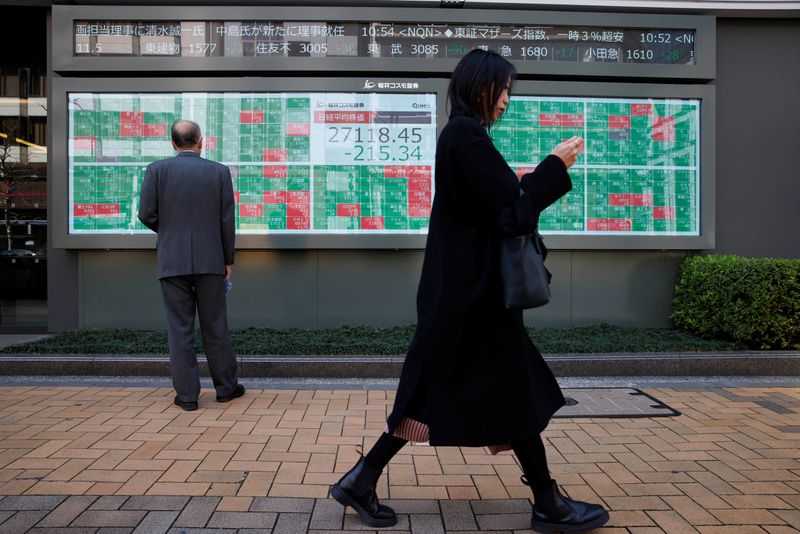
By Kevin Buckland
TOKYO (Reuters) - Japan's Nikkei share average rallied to the highest level in 34 years on Thursday, as chip-related shares tracked overnight gains on Wall Street peers.
The benchmark stock index was also supported by a weak currency, which boosts the outlook for exporters, amid a continued outlook for dovish monetary policy as Japan unexpectedly slipped into a recession at the end of last year.
The Nikkei rose as high as 38,127.85 for the first time since January 1990 - when the so-called "bubble economy" was just starting to deflate - before entering the midday recess at 37,948.35, up 0.65% from the previous close.
The Nikkei marked a record high of 38,957.44 on Dec. 29, 1989, the final trading day of that year.
"I can't believe we'd come this far and not have a look at those all-time highs," said Tony Sycamore, a markets analyst at IG, flagging the potential for a test of the level by end-March.
"Into the Japanese financial year-end, the Nikkei generally does well," he said. "But if it misses out, then we'll have to look towards the middle of the year," with the Nikkei tending to retreat at the start of the new fiscal year in April, he added.
On Thursday, chip-related shares provided the Nikkei with an outsized lift, taking cues from a 2.2% jump in the Philadelphia SE Semiconductor Index overnight, outpacing rallies for the main three Wall Street benchmarks.
Chip-making equipment giant Tokyo Electron contributed the most: 133 index points with a nearly 4% jump. Artificial intelligence-focused startup investor SoftBank (TYO:9984) Group provided a 49-point boost with a 3% rise.
Corporate earnings produced some outsized winners and losers, with green energy company Ebara and e-commerce company Rakuten Group each surging nearly 16%. Toy company Bandai Namco tumbled more than 15%.
The yen's slide below 150 per dollar this week has been broadly supportive, as it boosts the value of overseas revenues and makes products more competitive.
The Japanese currency has been weighed down by comments from top Bank of Japan officials that even if negative short-term interest rate policy is removed in coming months, further rate hikes are likely to be slow.
The timing of any policy tightening was further complicated on Thursday by the release of data showing the economy slipping into a recession.
"If we get a 10 basis point rate hike in April, that's not going to change anything for the Nikkei," said IG's Sycamore.
"When you look at the bigger picture, it all looks good."

SEOUL (Reuters) - South Korea has prepared a financial support programme of 75.9 trillion won ($56.97 billion) for companies increasing investment in key sectors as well as small businesses struggling with the impact of high interest rates.
The programme includes 15 trillion won worth of cheap policy loans from a state-run bank for key industries, such as semiconductor and battery, while commercial banks will also provide 20 trillion won to support small and medium-sized businesses, the Financial Services Commission said in a statement on Thursday.
"Our banks need to start making efforts to expand support for companies, beyond consumer financing focused on mortgage loans," said Chairman Kim Joo-hyun.
Evolving trade relations with China, technological advancement in major industries and fragmentation of global supply chains pose new challenges to companies, raising the need for regulatory reform and financial support, Kim said.
For companies facing liquidity trouble this year due to high interest rates, banks will offer a temporary cut in interest rates, the commission said.
($1 = 1,332.3700 won)
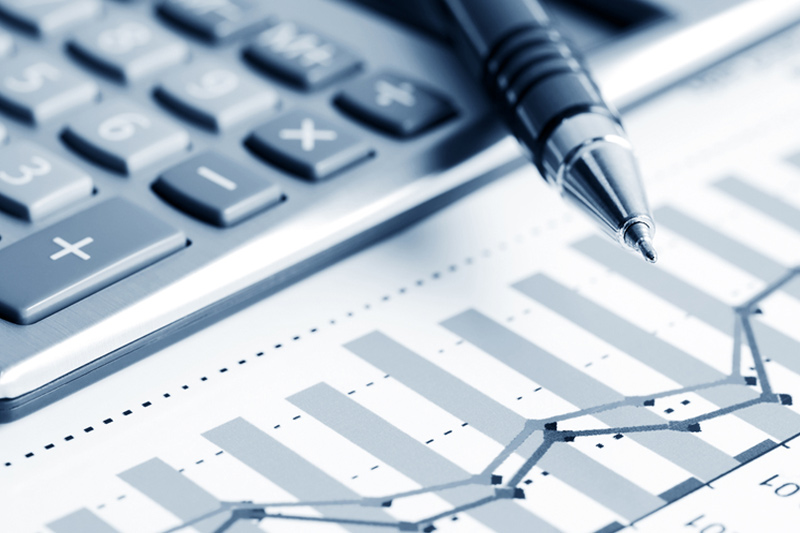
SEATTLE - The typical U.S. homeowner now remains in their residence for 11.9 years, a figure that has dropped from the peak of 13.4 years in 2020, which coincided with the onset of the pandemic, according to a report from Redfin (NASDAQ: NASDAQ:RDFN), a technology-powered real estate brokerage. This trend marks a significant change from two decades ago when the average tenure was 6.5 years.
The report indicates that the aging baby boomer population is a key factor in the extended homeowner tenure, with nearly 40% having lived in their current homes for over 20 years, and another 16% for 10-19 years. In contrast, less than 7% of millennials have stayed in their homes for more than a decade, reflecting their younger age and greater job mobility.
Gen Xers also show a propensity for longer stays in their homes, with 35% surpassing the 10-year mark. The data further reveals that the oldest members of Gen Z, who were 26 in 2023, typically have owned their homes for less than five years.
Financial incentives are a significant reason for older Americans to remain in their homes. More than half of the baby boomers who are homeowners have no outstanding mortgage, leading to a median monthly cost of ownership that is just over $600. Additionally, tax policies in some states, such as property tax deferrals for seniors in Texas and California's Proposition 13, which limits property tax increases, encourage longer homeowner tenure.
Another contributing factor to the increase in tenure since the early 2000s is the preference of many older Americans to age in place, supported by advancements in medical and home technology, as well as the financial benefits of staying put given the current higher mortgage rates.
The report also notes that the current lack of housing inventory and high costs are both a result of and a contributor to longer homeowner tenure. This dynamic poses challenges for young, first-time buyers, particularly as baby boomers own a disproportionate number of larger homes suitable for families.
Following the pandemic-induced moving frenzy, which saw a spike in home sales due to remote work and low mortgage rates, homeowner tenure has seen a modest decline. Redfin anticipates that tenure rates will either remain steady or increase slightly as homeowners are locked into low mortgage rates, and while home sales may rise this year, a significant surge is not expected.
This analysis is based on a press release statement from Redfin.
This article was generated with the support of AI and reviewed by an editor. For more information see our T&C.

